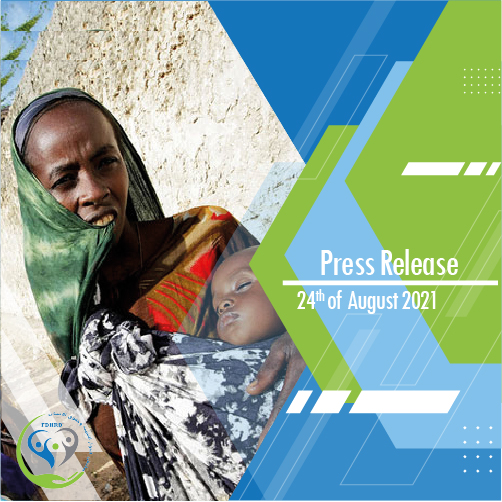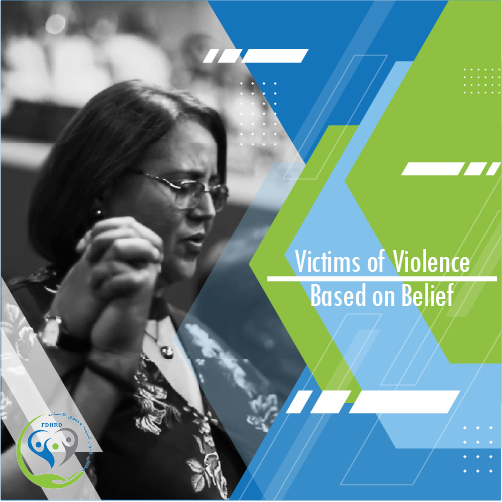Tuesday, August 24, 2021
Press Release
———————————————–
Today, Tuesday, August 24, 2021, the “African Studies Unit” at the Forum of Development and Human Rights Dialogue- FDHRD issued a report on “Women and Armed Conflicts in the African Sahel”.
The report discussed the political and security situations in the Sahel region and their impacts on human rights, the violations that occur to women in that region related to violent extremism, some statistically evidences, and the regional and international efforts to curb these violations and raise the levels of women’s social and economic equality.
The report indicated that the countries of the African Sahel face many political, security and economic challenges that are reflected on social life and mainly affect the basic human rights that an individual should enjoy. One of the most serious threats to human security in the region is the spread of insurgency and terrorist groups and their clear penetration in Internal affairs, since the countries of this region have not been able, after their independence to, build a national state with stable political institutions, so they remain exposed to chronic political and security crises.
The report stated that during the year 2020, terrorism launched (7,108) armed attacks against national armies and civilians, and these terrorist operations resulted in the loss of (12,519) lives. The fight against terrorism and rebel movements also resulted in the killing of Chadian President Idris Daby in April of this year 2021, after his participation in clashes near the capital, N’Djamena.
With regard to the humanitarian situation of women in the African Sahel, the report emphasized that the conflict in the African Sahel increases women’s vulnerability to sexual and gender-based violence, and that Islamist organizations and militias deliberately target women.
Women in the Sahel countries are victims of systematic attacks and kidnappings, and are forced into slavery as sex slaves. In addition, conflicting women are victims of rape, forced prostitution, pregnancy, abortion, sterilization and marriage, in addition to many other forms of sexual violence. The high risk and exposure to violence Sexual and gender-based violence during conflict leads to an increase in reproductive health problems, which are exacerbated especially with the lack of access to health services.
With regard to the reality of violations of women’s rights, the report stated that women and girls within the Sahel make up a large proportion of the refugees and the internally displaced population.
• In Burkina Faso, we find that (51%) of the displaced are girls under the age of fourteen, and that FGM and child marriage have increased with the increase in physical and food insecurity. Burkina Faso and Mali are also among the top six countries in terms of prevalence Child, early and forced marriage.
• In Niger, (70%) of women have been beaten or raped by their husbands, father or brother, and there is only one girl out of every ten girls who complete her secondary education. This is because girls in poor families drop out of education due to a lack of necessary resources, and the need to take care of their children because they often marry and become mothers at a very young age.
• In Mali, 1443 cases of sexual violence were reported between January and August 2020, of which (13%) were committed by armed groups.
• The report indicated that surveys showed that sexual violence is the most common type of gender-based violence, which has increased by approximately 12% due to the Corona pandemic.
• The report also indicated that general data on humanitarian needs for the year 2020 and subsequent humanitarian response plans for Burkina Faso, Mali and Niger indicate that (2.3) million women and girls need services to prevent, mitigate and respond to gender-based violence.
With regard to regional and international efforts to curb violations, the report stated the following:
• The African Sahel group announced in July 2020 the creation of a regional body at the permanent secretariat of the Sahel group to follow up on women’s issues and work on the implementation of relevant international conventions and covenants. The body includes representatives of civil society, parliament and rural women.
• In July 2021, the wife of the Mauritanian president, Dr. Maryam Fadel, called for the right of women in the countries of the African Sahel to participate in the areas of security and justice. She called on those in charge of the justice and security sectors, and commanders of the military and security staff, to encourage the participation of women in these professions and to work to overcome the obstacles that stand in the way. The Mauritanian initiative comes at the top of the priority of the Sahel countries in light of the high rates of violations and gender inequality under the armed conflict that prevails in the region.
• The Secretariat of the Sahel and West Africa and the Development Center of the Organization for Economic Cooperation and Development organized a dialogue entitled “DevTalk”, which touched on some strategies, including a set of comprehensive services for victims and survivors of sexual violence aimed at reducing the effects and consequences of harmful practices and preventing further trauma.
• The “Women’s Empowerment and Demographic Dividend Project in the Sahel Region” is being financed by the World Bank and implemented by the governments of Benin, Burkina Faso, Chad, Côte d’Ivoire, Mali, Mauritania, and Niger, which aims to enhance the empowerment of women and adolescent girls and their access to high-quality education, reproductive and maternal and child health services. This project is being implemented with technical support from the United Nations Population Fund (UNFPA) with $295 million in funding from the International Development Association (the arm of the World Bank that helps the world’s poorest countries).
• There is also the Gender Equality and Development Initiative in Africa within the African Development Strategy 2063, and the development of feasible programs for implementation to put an end to the violations of African women. Which aims to settle and empower the economic and social power of African women and their participation in issues of security and peace within their societies more.








